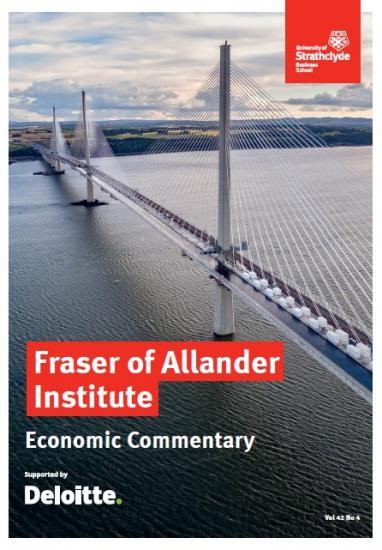Smooth Brexit Transition Crucial For Scotland's Economy - Fraser Of Allander Institute Economic Commentary Released Today
11th December 2018

Brexit crowding out vital debate on Scottish taxes, public spending and growing the economy
Based upon the latest data for 2018, the Scottish economy is on track to grow by its fastest rate since 2014. However, the Institute argues the outlook for 2019 and beyond is subject to unprecedented uncertainty and will hinge upon a series of crucial decisions taken in the UK Parliament over the next few weeks.
Leaving the EU without a ‘deal' or transition period would represent a severe ‘negative' economic shock. The latest forecasts, assuming there is a smooth transition, is for growth in Scotland of 1.4% in 2019, 1.5% in 2020 and 1.4% in 2021. A disorderly Brexit remains the biggest threat to Scottish jobs and growth, warns the Institute.
The Bank of England have set out a ‘worst-case' scenario which could see the UK economy shrink by around 8% from 2019. To put that in context this would be around double the size of the recession Scotland witnessed during the financial crisis, and would be equivalent to an extra 100,000 people unemployed in Scotland.
This week also sees the publication of the Scottish Government's Draft Budget for 2019/20. All eyes will be on what Derek Mackay will do on income tax - crucially whether or not he will narrow the tax gap with the rest of the UK for higher earners - and what measures he’ll take to secure opposition party support.
Graeme Roy, Director of the Fraser of Allander Institute said: "The Scottish economy has picked up after a challenging couple of years.
"In such uncertain times however, any assessment of the economic outlook must come with major health warnings. Whilst we don’t share the extremely negative view of some, we can say with some confidence that ‘no deal’ would be a substantial economic shock. Many businesses in Scotland are ill-prepared for such a disruptive change.
"Unfortunately, whatever happens over the coming weeks, it will not mark the end of the uncertainty. If parliament ultimately votes in favour of a Withdrawal Agreement the UK enters a near two-year transition process. But the most challenging issue - a future UK-EU trade deal - is yet to be agreed.
"Some will argue that a vote against will increase the likelihood of ‘no-deal’. Others argue that it provides a last opportunity to secure a softer Brexit.
“One of the frustrating things with the Brexit debate is that it has crowded out important discussions we should be having around key issues such as our ongoing weak productivity performance, the fact that around one million people in Scotland are classified as being in relative poverty (including one in four children), and how we respond to the challenges of an ageing population, climate change or automation.
“Indeed we’ve heard very little debate about tomorrow’s Scottish budget. But the decisions Mr Mackay will set out will have important implications for the relative competitiveness of our economy and the future of public spending in Scotland."
It is the issue of tax that is likely to dominate the headlines.
John Macintosh, Tax Partner at Economic Commentary sponsor Deloitte, said: “At the recent UK Budget the Chancellor announced his intention to raise the higher rate income tax threshold to £50,000 from next April. Mr Mackay has indicated he will not match this for Scottish income tax bands, which apply to earnings and pensions for Scottish residents. As a result there will be a more noticeable difference between those paying income tax at the higher rate in Scotland and their neighbours in the rest of the UK.
“What impact this will have on investment and growth in Scotland is the subject of much debate. However, particularly as the country’s productivity growth continues to struggle, it is vital that Scotland is seen as an attractive place for people and businesses. We have an ageing population, a shrinking working age population and it is crucial for our future that we do not deter people from choosing to come to Scotland."
On the overall Scottish Budget, today’s commentary says that the outlook for the Scottish budget in 2019/20 has improved since this time last year, with windfalls coming from two sources.
First, spending increases announced by the UK Government in its autumn budget will feed through to the Scottish block grant via the Barnett Formula.
Second, the significant increase in the Higher Rate Threshold announced by the UK Government (which amounts to a tax cut for higher rate taxpayers) will generate an additional windfall of around £200m – assuming the Scottish Government chooses not to raise the HRT in Scotland.
David Eiser, of the Fraser of Allander Institute, said: “Some of this windfall will likely be offset by a deterioration in the Scottish Fiscal Commission’s forecasts for Scottish income tax compared to this time last year. Even so, the budget in 2019/20 is likely to end up slightly higher than it was the previous year.
“Whilst there is some uncertainty around tax choices, there is perhaps more certainty about the direction of the government’s key spending choices. Spending on health accounts for almost 50% of the Scottish resource budget, up from 37% in 1999. Government spending is increasingly retrenching onto core areas of health, social care and education, with spending associated with the environment, culture and recreation falling substantially."
Download the full Fraser of Allander Institute Economic Commentary here -
https://www.sbs.strath.ac.uk/economics/fraser/20181211/2018-12_FAI_Economic_Commentary_with_Perspectives.pdf
